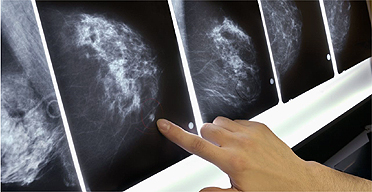
Women who eat red meat every day are almost twice as likely to develop certain types of breast cancer, a long-term study published today has found.
Scientists who monitored 90,000 women for more than a decade found that those who ate a high meat diet were much more prone to developing the hormonally reactive breast cancers, which account for more than half of all breast cancers.
The scientists suggest that synthetic hormones used in meat production could be behind the trend.
The findings from Harvard Medical School are based on tracking women from 1991, when their average age was 36, until 2003. They completed regular questionnaires to record how often they consumed more than 130 different foods and drinks as scientists tried to establish possible links to cancer. Every two years, they were asked to report whether or not they had developed breast cancer.
Only premenopausal women with no previous cancer were included.
By the end of the study, 1,021 women had developed breast cancer. Of those, 512 were hormone receptor-positive, meaning the growth of their tumours responded to progesterone and oestrogen.
When the women were assigned to five groups depending on their red meat intake, the researchers found that those consuming most had the highest risk of developing this form of cancer.
Women who ate more than one-and-a-half servings of red meat such as lamb, beef or pork, daily had almost double the risk of hormone receptor-positive breast cancer compared with those who ate three or fewer servings per week, the findings published in the journal Archives of Internal Medicine show.
Eunyoung Cho, who led the research at Brigham and Women's Hospital in Boston, said: "This study suggests that dietary factors may be related to a woman's chance of developing this type of breast cancer, a disease that is on the rise.
"The reason why the amount of red meat consumed by a premenopausal woman was related to her breast cancer risk is unknown, but this study shows that it has a strong association and that more research should be done to further explore this connection," she added.
"Several biological mechanisms may explain the positive association between red meat intake and hormone receptor-positive breast cancer risk," the authors write. "Known cancer-causing compounds in cooked or processed red meat increase mammary tumours in animals and have been suspected of causing breast cancer in humans. In addition, cattle in the United States are treated with hormones to promote growth, which could also influence breast cancer risk."
They say that because other factors which make women susceptible to breast cancers, such as the genetic links, cannot be changed, their findings "have potential public health implications in preventing breast cancer and should be evaluated further". A link between high red and processed meat diets has previously been made with cancer or the bowel, stomach and oesophagus.
The research is the latest foray into a much-studied subject. In 2003, scientists writing in the International Journal of Cancer found no increased likelihood of breast cancer from a diet high in red meat, but a paper in the Lancet that same year found that eating saturated fat from meat increased a woman's risk.
The results were welcomed with caution by cancer charities.
Maria Leadbeater, of Breast Cancer Care, said that although the study was large and was providing other interesting insights into cancer trends, food surveys were notoriously unreliable as people rarely accurately recalled their diets. "We welcome any insight into possible links, but there are still questions about this and it needs further work. Vegans and vegetarians still get breast cancer," she said.
"We would still recommend that people follow a varied and balanced diet as recommended by the Food Standards Agency which includes some but no excessive quantities of protein."
Henry Scowcroft, scientific information office at Cancer Research UK said: "According to this study, a woman would need to eat more than one-and-a-half portions of meat a day, every day, to significantly increase her risk of hormone-sensitive breast cancer before the menopause.
"But the overall risk of premenopausal breast cancer is low when compared to getting the disease after the menopause. So even at the highest rates of meat consumption, this is, overall, still a relatively small increase."

